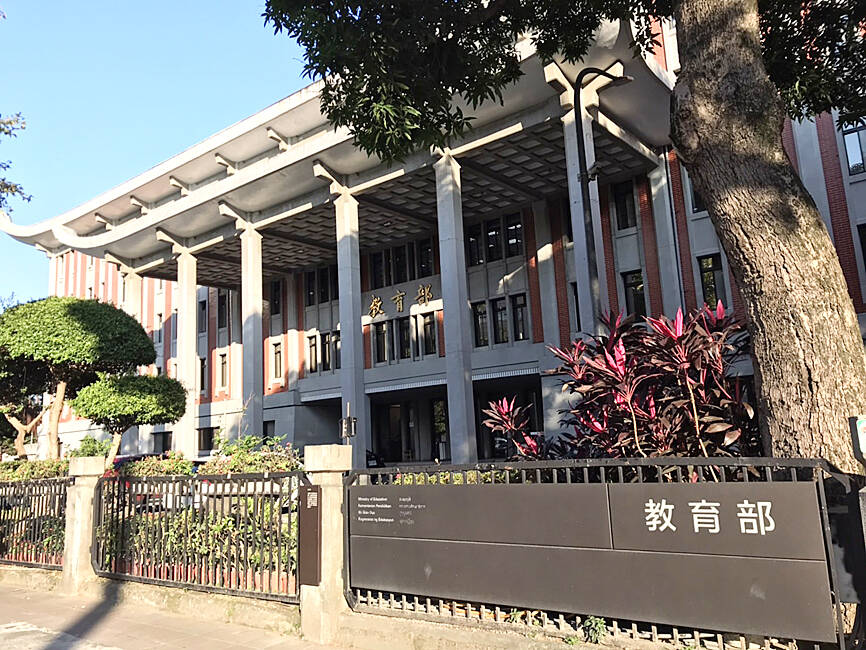The Corpus of Taiwanese Hoklo established by the National Academy for Educational Research has been launched online, with more than 56,000 searchable entries, the Ministry of Education said.
The ministry last year commissioned the academy to compile the collective knowledge of Hoklo (commonly known as Taiwanese) and build a retrieval system, enabling searches among more than 56,000 entries and approximately 1,400 words designated for Hoklo-language textbooks.
The system has three subsystems — linguistic material, textbook words and grammar, the ministry said, adding that it is a resource for curriculum design, proficiency assessments and linguistic research.

Photo: Yang Mien-chieh, Taipei Times
Teachers can consult the system to find words and information from Hoklo-language textbooks, as well as collocations — words or terms that are together more often than would be expected by chance — correlatives and audio of retrievable words to enrich their course content, while using the system’s descriptions and example sentences to help students learn better, it said.
An additional corpus of more than 26,000 Hoklo sentences, along with audio files, and artificial intelligence (AI) tools and models, is also available via an app, the ministry said, adding that it can be used as the cornerstone of AI development in speech processing and computer-assisted instruction.
Department of Lifelong Education official Chi Hsien-yang (紀咸仰) said that the retrieval system also has example sentences from the official Hoklo dictionary approved by the ministry, as well as the Mandarin-Hoklo Bilingual Dictionary (華台對照詞典) compiled by Lu Kuang-cheng (盧廣誠).
For example, querying the system for “sleepy,” which is denoted as “khun” (睏) in Hoklo, would yield the correlative entries of “hioh-khun” (歇睏, “rest”) and “hioh-khun-jit” (歇睏日, “rest day”), with links to the ministry’s Hoklo Idioms Dictionary (教育部台灣台語常用詞辭典) for further information, Lu said.
Some entries have audio files of example sentences to enhance systematic learning of Hoklo, Chi said.
Deputy Minister of Education Yeh Ping-cheng (葉丙成) on Monday wrote on Facebook that the launch of the system marked a milestone in the ministry’s history, with the content open to teachers and entrepreneurs to bolster the education sector and innovate digital learning products.
About a decade ago, the ministry granted lots of resources to universities to develop digital education resources, but most of them were rarely visited, as the universities were not adept at promoting the content, Yeh said.
Making the ministry’s resources, including the Hoklo corpus, public would facilitate teaching and software innovations, while also nurturing more research and development that could lead to a local education industry ecosystem in Taiwan, he said.
“The ministry would continue to compile digital content that were rarely visited and used, and allow people to tap into the resources via apps, expecting the new method to help build a prosperous ecosystem of the education industry in Taiwan,” he said.

EUROPEAN TARGETS: The planned Munich center would support TSMC’s European customers to design high-performance, energy-efficient chips, an executive said Taiwan Semiconductor Manufacturing Co (TSMC, 台積電), the world’s largest contract chipmaker, yesterday said that it plans to launch a new research-and-development (R&D) center in Munich, Germany, next quarter to assist customers with chip design. TSMC Europe president Paul de Bot made the announcement during a technology symposium in Amsterdam on Tuesday, the chipmaker said. The new Munich center would be the firm’s first chip designing center in Europe, it said. The chipmaker has set up a major R&D center at its base of operations in Hsinchu and plans to create a new one in the US to provide services for major US customers,

BEIJING’S ‘PAWN’: ‘We, as Chinese, should never forget our roots, history, culture,’ Want Want Holdings general manager Tsai Wang-ting said at a summit in China The Mainland Affairs Council (MAC) yesterday condemned Want Want China Times Media Group (旺旺中時媒體集團) for making comments at the Cross-Strait Chinese Culture Summit that it said have damaged Taiwan’s sovereignty, adding that it would investigate if the group had colluded with China in the matter and contravened cross-strait regulations. The council issued a statement after Want Want Holdings (旺旺集團有限公司) general manager Tsai Wang-ting (蔡旺庭), the third son of the group’s founder, Tsai Eng-meng (蔡衍明), said at the summit last week that the group originated in “Chinese Taiwan,” and has developed and prospered in “the motherland.” “We, as Chinese, should never

‘A SURVIVAL QUESTION’: US officials have been urging the opposition KMT and TPP not to block defense spending, especially the special defense budget, an official said The US plans to ramp up weapons sales to Taiwan to a level exceeding US President Donald Trump’s first term as part of an effort to deter China as it intensifies military pressure on the nation, two US officials said on condition of anonymity. If US arms sales do accelerate, it could ease worries about the extent of Trump’s commitment to Taiwan. It would also add new friction to the tense US-China relationship. The officials said they expect US approvals for weapons sales to Taiwan over the next four years to surpass those in Trump’s first term, with one of them saying

‘ABUSE OF POWER’: Lee Chun-yi allegedly used a Control Yuan vehicle to transport his dog to a pet grooming salon and take his wife to restaurants, media reports said Control Yuan Secretary-General Lee Chun-yi (李俊俋) resigned on Sunday night, admitting that he had misused a government vehicle, as reported by the media. Control Yuan Vice President Lee Hung-chun (李鴻鈞) yesterday apologized to the public over the issue. The watchdog body would follow up on similar accusations made by the Chinese Nationalist Party (KMT) and would investigate the alleged misuse of government vehicles by three other Control Yuan members: Su Li-chiung (蘇麗瓊), Lin Yu-jung (林郁容) and Wang Jung-chang (王榮璋), Lee Hung-chun said. Lee Chun-yi in a statement apologized for using a Control Yuan vehicle to transport his dog to a